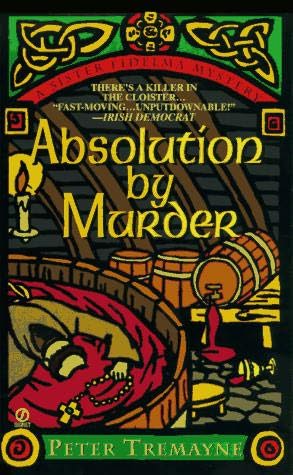Absolution by Murder
by Peter Tremayne

Reviewed by Coral
As Christianity spreads through the Saxon world, Oswy, the Saxon king, finds himself confronted with an important question: should the Saxons follow the religious tenants put down by Rome or those of the Celtic people? To answer this question he invites distinguished men and women from both churches to his country for a debate.
Invited to this debate are Sister Fidelma, who's sharp mind has earned her a reputation that precedes her, Brother Eadulf, a Saxon who follows the Roman tenants, and Abbess Etain, who is to be the main speaker for the Celtic Church. However, just as the debate is about to open, Etain is found brutally murdered in her room. Now, as the Celtic faction and those who hold to their beliefs begin to point fingers at the Roman faction, Oswy finds himself on the verge of a war, so he turns to Fidelma for help solving the case.
Finding herself unceremoniously partnered with Eadulf - so there can be no complaints of bias - Fidelma must track down a killer before a civil war breaks out.
I love reading mystery books for the simple fact that I am really bad at figuring them out, the reveal of the killer and the underlying motive usually come as a surprise to me. Even mediocre mystery books hold some enjoyment for me, because of that surprise waiting for me at the end. So, the fact that the killer was painfully obvious before the half-way point doesn't say a lot about the quality of this book. Even the motive was obvious!
One good thing about this book is that I finally got the answer to a question that's been bugging since I read Alice Borchardt's Beguiled, about how the Catholic priest Owen could be a Catholic priest and still be married. I didn't realize that celibacy wasn't always a required part of the Catholic priesthood.
I'm also starting to really wonder about that Irish history class I took, because every book I've read since then seems to contradict what I learned my first day about Ireland not having kings. My teacher said that many people claimed the title but that there was not a centralized ruling government in place. At least the book talked about the differences between Roman Catholicism and Celtic Catholicism, which was also something my teacher went into.
Another problem I had with this book was the main character, Fidelma. First off, I hated how she viewed the Saxons as inferior. The interaction between her and Eadulf seemed tired and something I've read a million times before. I also didn't care for Fidelma's interaction with Oswy. The problem, mainly, is that Fidelma believes her position in the Celtic courts makes her superior to everyone and that her authority extends to the Saxon world. I'm not sure if it comes from some authors' inability to write decent compelling women characters, because most of the characters that I have this problem with are women. I think we're supposed to find them strong and authoritative, but they just end up seeming needlessly bitchy and overly-confrontational.
Kind of like this season's Veronica Mars.
Grade: F